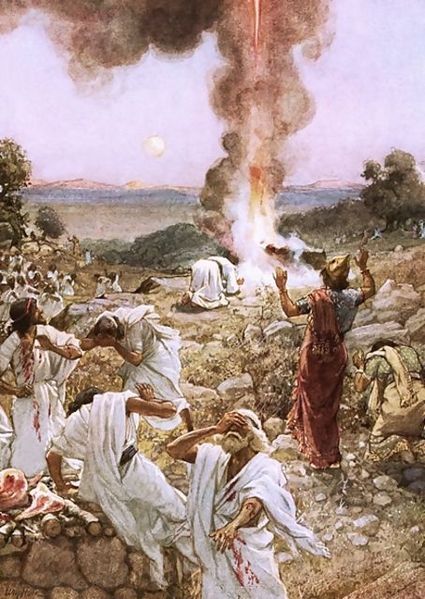Through the years individuals have asked me about the unsettling elements of the Judeo-Christian bible which seem to advocate and celebrate tribalism and violence. They are certainly present in scripture and can be quite disturbing. After a lifetime as a Christian I'm still challenged by the ugliness of commands to slaughter innocents in conquered towns or the story of the prophet Elijah killing the 450 opposing prophets of Baal. I mean, they are clearly the bad guys in the story, but the prophet-cide is way over the top. I learned this story as a kid, and likely from a children's bible!

There are plenty of people who dismiss the Judeo-Christian scriptures and tradition because of parts of it's gory "Good Book." We have to recognize that this is present and we can't just dismiss it, nor should we blithely accept it because it's in the bible. And we can't ignore dark moments in history when some Christians have used these passages to justify their own violence.
Yet...yet there is the great scriptural symphony of God's covenantal, abiding love which has the final movement of Jesus, the Christ, who is love incarnate. Jesus, who dies a violent and sacrificial death, is both peacemaker and the Prince of Peace, a term taken from the book of Isaiah.
All of this came to mind as a I read a review of two books related to Islam in the New York Times called Illuminating Islam’s Peaceful Origins. The excellent reviewer, Mustafa Akyol, author of “Islam Without Extremes” and The Islamic Jesus, is a senior fellow on Islam and modernity at the Cato Institute.
The books are God in the Qur'an by Jack Miles, a professor of religion and Christian, and Muhammad: Prophet of Peace Amid the Clash of Empires by Juan Cole.
The review begins: "Is Allah, the God of Muslims, a different deity from the one worshiped by Jews and Christians? Is he even perhaps a strange “moon god,” a relic from Arab paganism, as some anti-Islamic polemicists have argued? What about Allah’s apostle, Muhammad? Was he a militant prophet who imposed his new religion by the sword, leaving a bellicose legacy that still drives today’s Muslim terrorists?"
These are excellent questions and ones which critics and enemies of Islam answer with an emphatic "yes!" As the title suggests, the authors of these books come to different conclusions in thoughtful and nuanced ways. In his conclusion about God in the Qur'an Akyol offers:
Miles, a Christian, is as objective, fair and gracious as one can get. In the beginning, he declares his own “suspension of disbelief,” which means letting go of his non-Muslimness and reading the Quran on its own terms. At the end, he turns back to his faith and reminds us: “The Bible is my Scripture, the Quran is theirs.” Yet by reading the latter with respect, he thinks non-Muslims can find it “a little easier to trust the Muslim next door, thinking of him as someone whose religion, after all, may not be so wildly unreasonable.
This review is a reminder that it is essential for Christians to demonstrate charitas, truly charitable love to those who worship differently than we do. That love will not settle for stereotypes and suspicions which result in alienation and anger. God knows we have enough of that to address in our own faith without trashing others.
Comments?
https://www.nytimes.com/2018/12/26/books/review/illuminating-islams-peaceful-origins.html
No comments:
Post a Comment